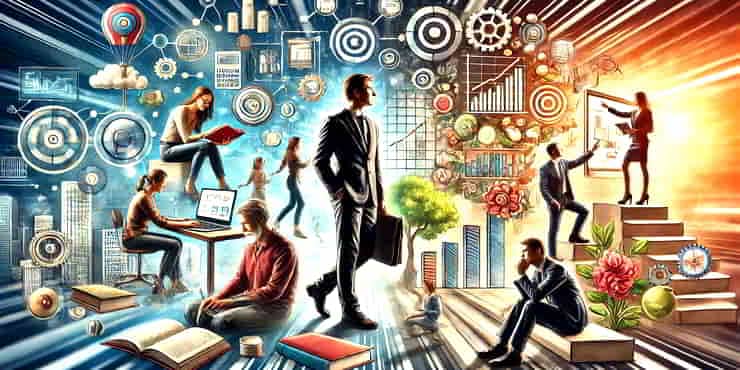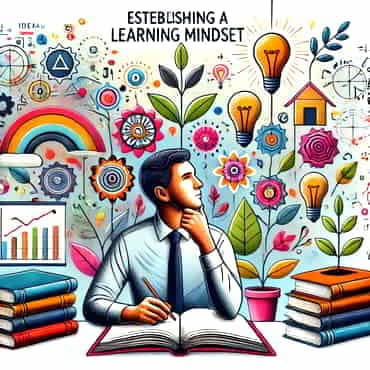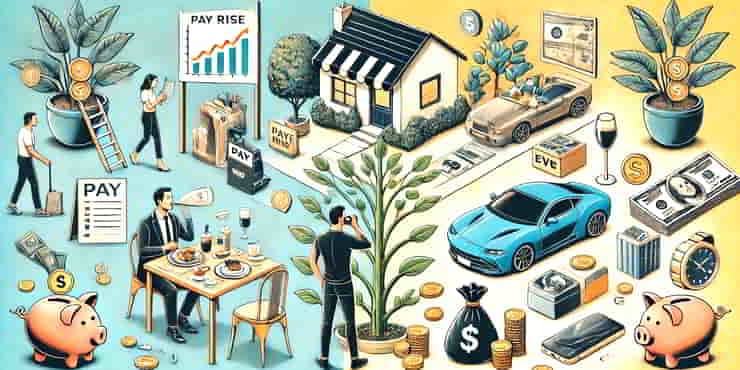Continuous Learning: Keeping Skills Sharp

Estimated reading time: 10 Min
With a mindset of continuous learning and keeping skills sharp, you can unlock a world of personal and professional growth and manage your life with confidence.
Nowadays, our ability to learn and adapt continuously is more critical than ever before.
The concept of continuous learning, also known as lifelong learning, emphasises the ongoing acquisition of knowledge, skills, and competencies throughout one’s career.
It involves a mindset of curiosity, adaptability, and a commitment to continuous self-improvement.
Such a powerful and practical mindset enables professionals to stay relevant, competitive, and prepared for the ever-changing demands of their respective industries.
In today’s fast-paced and dynamic environment, for professionals who wish to keep their skills updated to remain competitive in their respective fields, continuous learning has become a necessity, especially where technological advancements and industry disruptions are the norm.
In addition, continuous learning not only helps professionals stay relevant in their fields but also delivers opportunities for personal growth and development.
However, the consequences of failing to embrace continuous learning can be severe, including obsolescence, stagnation, and missed opportunities for career advancement.
So, it’s essential for individuals to actively seek out new knowledge and experiences, expand perspectives, enhance problem-solving abilities, and develop a more well-rounded skill set.
This, in turn, can lead to increased job satisfaction, career mobility, and overall professional success.
Establishing a Learning Mindset

The first step in embracing continuous learning is cultivating a mindset of curiosity and a genuine willingness to learn.
This involves actively seeking out new information, challenging existing assumptions, and embracing a growth mindset, including the belief that one’s abilities and knowledge can be developed through dedication and hard work.
Despite the recognised benefits of continuous learning, many people struggle to overcome various barriers that may hinder their progress.
These barriers can include time constraints, lack of resources, fear of failure, or resistance to change.
Identifying and addressing these barriers is important for sustaining a consistent learning practice.
Developing a proactive approach to developing new skills involves actively seeking out learning opportunities, setting aside dedicated time for learning activities, and creating a supportive environment that encourages continuous growth.
This may involve joining professional associations, attending conferences or workshops, participating in online courses, or engaging in mentorship programmes.
Identifying Personal and Professional Learning Goals
Numerous professionals across various industries have embraced continuous learning and reaped the benefits of staying current and adaptable.
The following case studies showcase individuals who have successfully navigated career transitions, acquired new skills, or achieved significant professional growth through their commitment to lifelong learning.
Example 1: A Marketing Manager’s Transition into Data Analytics
Sarah, a marketing manager in her late 30s, found herself increasingly drawn to the world of data analytics.
As digital marketing strategies became more data-driven, she decided to enhance her skills in this area.
Through a combination of online courses, industry certifications, and hands-on projects, Sarah acquired proficiency in data analysis tools and techniques.
Her dedication to continuous learning paid off when a data analyst role opened up within her company.
Sarah’s ability to speak the language of both marketing and analytics made her an ideal candidate, and she successfully moved into her new role.
She credits her willingness to step out of her comfort zone and invest in continuous learning as the key factors that enabled this career change.
Example 2: A Nurse Practitioner’s Journey in Telemedicine
During the COVID-19 pandemic, telemedicine became an essential component of healthcare delivery.
Seeing this shift, Jessica, a nurse practitioner in her 40s, proactively sought to upskill herself in the realm of virtual healthcare.
She participated in webinars, online courses, and seminars focused on telemedicine best practices, patient communication strategies, and the effective use of technology.
Jessica’s commitment to continuous learning allowed her to seamlessly integrate telemedicine into her practice, providing high-quality care to patients while minimising risks.
Her dedication to staying current with the latest developments in her field has positioned her as a thought leader in telemedicine, and she now mentors other healthcare professionals embarking on similar journeys.
Your Route
By analysing the stories and experiences of successful continuous learners like Sarah and Jessica, valuable lessons and insights can be realised.
These include the importance of developing a growth mindset, embracing change, and being proactive in identifying and addressing skill gaps.
Additionally, these stories highlight the value of searching out various learning resources, such as online courses, industry events, and hands-on projects, to effectively acquire new knowledge and skills.
Maintaining persistence and resilience throughout the learning process is also vital, as career transitions or skill acquisitions rarely happen overnight.
Interviews with professionals from diverse fields, such as technology, healthcare, finance, or education, can provide further valuable insights into the practical application of continuous learning principles.
These individuals can share their personal experiences, strategies, and lessons learned, offering inspiration and guidance for those embarking on their own continuous learning journeys.
Effective Learning Strategies for Professionals
Individuals have different learning styles and preferences, and understanding your own preferred learning modalities can greatly enhance the effectiveness of continuous learning efforts.
Some common learning styles include visual, auditory, kinaesthetic, and read/write.
Incorporating a variety of learning methods, such as reading, watching videos, attending workshops, or hands-on practice, can cater to different learning preferences and lead to better retention and application of knowledge.
For working individuals, finding time for continuous learning and maintaining energy levels, amidst busy schedules, can be a significant challenge.
Effective time management strategies, such as blocking dedicated learning time, prioritising tasks, and leveraging downtime (e.g., commuting or waiting periods), can help integrate learning into daily routines.
The rise of online education platforms and digital learning resources has made continuous learning more accessible than ever before.
Professionals can take advantage of massive open online courses (MOOCs), online certifications, webinars, podcasts, and other digital resources to enhance their knowledge and skills at their own pace and convenience.
From Learning to Mastery: Deepening Your Expertise

Continuous learning is a direction that begins with acquiring basic knowledge and progresses towards subject matter expertise and mastery.
This progression often involves several stages, including understanding foundational concepts, applying knowledge through practice and hands-on experience, seeking feedback and guidance from experts, and continuously refining and deepening one’s understanding.
A word of warning: learning on the job is easier now than ever in the past, and committing beyond your comfort zone can lead to significant advances.
But avoid “trying to run before you can walk”—that’s more than a simple stretch.
Practice and application are essential components of the learning process, as they allow individuals to reinforce their knowledge and develop practical skills.
Engaging in real-world projects, simulations, or case studies can provide valuable opportunities to apply newly acquired knowledge and refine one’s abilities.
Learning from experienced professionals, through mentorship or coaching programmes, can significantly accelerate the learning process and provide valuable insights and guidance.
Additionally, collaborating with peers, engaging in professional networks, and participating in knowledge-sharing communities can foster a rich learning environment and facilitate the exchange of ideas and best practices.
Evaluating Your Learning Progress and Adapting
Regularly evaluating one’s learning progress is vital for ensuring continuous growth and identifying areas for improvement.
Self-assessment methods can include reflective journaling, skill audits, or seeking feedback from mentors or colleagues.
Reflecting on successes, challenges, and areas for further development can help individuals make informed decisions about their learning journey and next steps.
Seeking feedback from various sources, such as peers, supervisors, or industry experts, can provide valuable insights into areas for improvement and help identify blind spots.
Incorporate this feedback into your learning plan to enhance the effectiveness of continuous learning efforts and ensure that skill development remains aligned with industry expectations and best practices.
As individuals progress through their continuous learning journey, it is essential to adapt and refine their plans based on self-assessment, feedback, and changing circumstances.
This may involve adjusting learning goals, exploring new learning methods or resources, or seeking additional support or guidance from mentors or experts.
Continuous Learning in Action: Success Stories
Numerous professionals across various industries have embraced continuous learning and reaped the benefits of staying current and adaptable.
Interviews with professionals from diverse fields, such as technology, healthcare, finance, or education, can provide valuable insights into the practical application of continuous learning principles.
By analysing the stories and experiences of successful continuous learners, valuable lessons and insights can be gleaned.
Here are another couple of case studies, In these cases, they’re well-known individuals who indulged in continuous learning; some of their stories might surprise you:
Case study 1: Howard Schultz: Reinventing Starbucks
Howard Schultz, the former CEO of Starbucks, is a prime example of how continuous learning can lead to tremendous success.
Schultz grew up in a low-income family and was the first in his family to attend college.
After graduating, he worked for a company that sold coffee makers.
His inspiration to create coffee shops serving as community hubs came from the Italian coffee culture he observed during a business trip to Milan.
Schultz joined Starbucks, which at the time was a small coffee bean retailer, and eventually acquired it. He applied what he learned in Italy to transform Starbucks into a global brand, focusing on creating a welcoming atmosphere and providing high-quality coffee.
Key Takeaways:
- Schultz’s continuous learning and willingness to adopt new ideas led to the reinvention of Starbucks.
- His ability to observe, learn, and implement new concepts played a crucial role in the company’s success.
- Schultz’s story underscores the importance of being open to new experiences and learning from them to drive innovation and growth.
Case study 2: Oprah Winfrey: A Lifelong Learner
Oprah Winfrey’s journey from a challenging childhood to becoming a global media mogul is a testament to the power of continuous learning.
Born into poverty, Winfrey faced numerous obstacles, including a turbulent family life and abuse.
Despite these challenges, she excelled in school and earned a scholarship to Tennessee State University.
Winfrey’s career in media began in radio and local television, but her big break came when she was hired to host a struggling talk show in Chicago.
Through continuous learning and adaptation, Winfrey transformed the show into “The Oprah Winfrey Show,” which became one of the highest-rated and most influential programmes in television history.
Throughout her career, Winfrey has demonstrated a commitment to learning and personal growth.
She has expanded her brand to include a magazine, a television network, and various philanthropic efforts.
Winfrey’s success can be attributed to her relentless pursuit of knowledge and her ability to adapt and grow.
Key Takeaways:
- Oprah Winfrey’s story highlights the importance of resilience and continuous self-improvement.
- Her ability to learn from experiences and adapt her approach was key to her success.
- Winfrey’s dedication to lifelong learning has enabled her to stay relevant and influential across multiple industries.
FAQs: Keeping Skills Sharp
How can I find the time for continuous learning amidst a busy schedule?
Time management is an essential skill. Prioritise learning by blocking out dedicated time in your schedule. You can also leverage pockets of free time, like commutes or waiting periods, for learning activities like listening to podcasts or reading articles.
What are the most effective online learning platforms and resources?
Popular platforms include Coursera, edX, Udemy, and LinkedIn Learning. Additionally, many universities and professional organisations offer online courses and certifications. It’s also valuable to follow industry leaders and experts on social media or blogs.
How can I stay motivated and overcome barriers to continuous learning?
Set specific, achievable goals aligned with your aspirations. Celebrate small wins, and find an accountability partner. Overcoming initial resistance is key; once you build momentum, learning becomes more enjoyable.
How do I choose which skills or knowledge areas to focus on?
Assess your current role, industry trends, and long-term career goals. Identify the most valuable and in-demand skills for your desired path. It’s also helpful to consult mentors or colleagues for guidance.
Summary
Continuous learning is a critical skill for professional and personal growth in today’s fast-moving world.
Continuous learning is an ongoing journey, and the list of resources below can serve as a starting point for individuals seeking to expand their knowledge and skills.
Remember, the key is to find the methods and resources that best align with your learning style, goals, and preferences.
By embracing a mindset of continuous learning, professionals can unlock a world of personal and professional growth for keeping skills sharp, staying ahead of industry changes, and managing their careers with confidence and adaptability.
If you’ve enjoyed this post, please share.
😉
Richard
Useful Resources
- A learning platform for building your own online business: Wealthy Affiliate
- Online Course Platforms: Coursera, edX, Udemy, LinkedIn Learning, Skillshare
- Educational Websites and Blogs: Khan Academy, MIT OpenCourseWare, Highbrow, and Harvard Business Review
- Podcasts: HBR IdeaCast, The Knowledge Project, and Revisionist History
- Learning Apps: Duolingo, Brilliant, Blinkist, and Udemy
- Professional Associations and Communities: Industry-specific organisations, meetup groups, online forums
- Books and Audiobooks: Non-fiction, biographies, industry publications
- Mentorship Programmes: Within companies or professional networks






